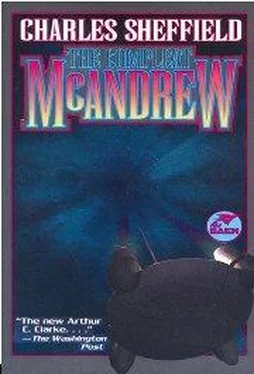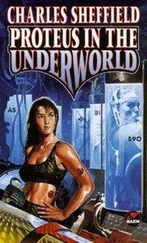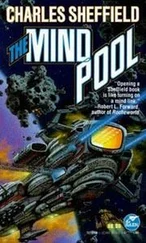He stood quietly for a moment, head slightly bowed. Then he nodded and ran his hand over his sandy, receding hair-line.
“That sounds like Bryson,” he said. “Well, I doubt if Yifter will eat any of us for breakfast. I’m not sure he’ll be any worse than the rest of you. I’ll be there, Jeanie.”
I breathed a small sigh of relief, and left him. McAndrew, as I knew from experience, was the Compleat Pacifist. I had wanted to be sure that he could stand the idea of meals with Yifter.
Four hours later, all our checks were complete. I switched on the fields. The dull grey exterior of each Section turned to silver, shattering the sunlight and turning the Assembly to a cluster of brilliants. The cables linking the Sections were still in position, but now they were hanging loose. All stresses had been picked up by the balancing fields. In the Control Stage, I gradually turned on the propulsion units of each powered Section. Plasma was fed through the ergosphere of each kernel, picked up energy, and streamed aft. The relative positions of the Sections, Mossbauer-controlled to within fractions of a micrometer, held steady. We accelerated slowly away from L-5, and began the long spiral of a continuous-impulse orbit to Titan.
My work was just about finished until crossover time. The computers monitored the drive feeds, the accelerations, and all the balance of the Sections. On this trip, we had three units without operating drive units: Section Two, where Yifter’s guards were housed, just behind the Control Stage; Section Seven, where McAndrew had taken the kernel out of commission for his usual endless and mysterious experiments; and of course, the Control Stage itself. I had made the mistake of asking McAndrew what experiments he was planning for this trip. He looked at me with his innocent blue eyes and scribbled an answer full of twistor diagrams and spinor notation — knowing damn well that I wouldn’t be able to follow it. He didn’t like to talk about his work “halfcooked,” as he put it.
* * *
I had been more worried than I wanted to admit about dinner on that first ship-evening. I knew we would all be itching to ask Yifter about the Lucies, but there was no easy way to introduce the subject into the conversation. How could we do it? “By the way, I hear that you killed a billion people a few months ago. I wonder if you would like to say a few words on the subject? It would liven up the table-talk at dinner.” I could foresee that our conversation might be a little strained.
As it turned out, my worries were unnecessary. The first impression that I’d had of Yifter, of a mild and amiable man, strengthened on longer exposure. It was Bryson, during dinner, who caused the first tricky moment.
“Most of Earth’s problems are caused by the United Space Federation’s influence,” he said as the robo-server, always on best form at the beginning of the trip, rolled in the courses. “If it weren’t for the USF, there wouldn’t be as much discontent and rioting on Earth. It’s all relative, living space and living standards, and the USF sets a bad example. We can’t compete.”
According to Bryson, three million people were causing all the problems for ten billion — eleven, before Yifter’s handiwork. It was sheer nonsense, and as a USF citizen, I should have been the one to bridle; but it was McAndrew who made a growling noise of disapproval, down in his throat; and it was Yifter, of all people, who sensed the atmosphere quickest, and deftly steered the conversation to another subject.
“I think Earth’s worst problems are caused by the power shortage,” he said. “That affects everything else. Why doesn’t Earth use the kernels for power, the way that the USF does?”
“Too afraid of an accident,” replied McAndrew. His irritation evaporated immediately at the mention of his specialty. “If the shields ever failed, you would have a Kerr-Newman black hole sitting there, pumping out a thousand megawatts — mostly as high-energy radiation and fast particles. Worse than that, it would pull in free charge and become electrically neutral. As soon as that happened, there’d be no way to hold it electromagnetically. It would sink down and orbit inside the Earth. We couldn’t afford to have that happen.”
“But couldn’t we use smaller kernels on Earth?” asked Yifter. “They would be less dangerous.”
McAndrew shook his head. “It doesn’t work that way. The smaller the black hole, the higher the effective temperature and the faster it radiates. You’d be better off with a much more massive black hole. But then you’ve got the problem of supporting it against Earth’s gravity. Even with the best electromagnetic control, anything that massive would sink down into the Earth.”
“I suppose it wouldn’t help to use a nonrotating, uncharged hole, either,” said Yifter. “That might be easier to work with.”
“A Schwarzschild hole?” McAndrew looked at him in disgust. “Now, Mr. Yifter, you know better than that.” He grew eloquent. “A Schwarzschild hole gives you no control at all. You can’t get a hold of it electromagnetically. It just sits there, spewing out energy all over the spectrum, and there’s nothing you can do to change it — unless you want to charge it and spin it up, and make it into a kernel. With the kernels, now, you have control.”
I tried to interrupt, but McAndrew was just getting warmed up. “A Schwarzschild hole is like a naked flame,” he went on. “A caveman’s device. A kernel is refined, it’s controllable. You can spin it up and store energy, or you can use the ergosphere to pull energy out and spin it down. You can use the charge on it to move it about as you want. It’s a real working instrument — not a bit of crudity from the Dark Ages.”
I shook my head, and sighed in simulated despair. “McAndrew, you have an unconsummated love affair with those blasted kernels.” I turned to Yifter and Bryson, who had watched McAndrew’s outburst with some surprise. “He spends all his waking hours spinning those things up and down. All the last trip, he was working the kernels in gravitational focusing experiments. You know, using the fact that a gravity field bends light rays. He insists that one day we won’t use lenses for optics — we’ll focus light using arrays of kernels.”
I made the old joke. “We hardly saw him on that trip. We were convinced that one day he’d get careless with the shields, fall into one of the kernels, and really make a spectacle of himself.”
They didn’t get it. Yifter and Bryson looked at me blankly, while McAndrew, who’d heard it all ten times before, chuckled. I knew his simple sense of humor — a bad joke is always funny, even if it’s the hundredth time you’ve heard it told.
It’s a strange thing, but after the first half-hour I had stopped thinking of Yifter as our prisoner. I could understand now why Bryson had objected to the idea of surrounding Yifter with armed guards. I’d have objected myself. He seemed the most civilized man in the group, with a warm personality and a very dry and subtle sense of humor.
When Bryson left the table, pleading a long day and a lack of familiarity with a space environment, Yifter, McAndrew and I stayed on, chatting about the previous trips I had made to Titan. I mentioned the time I had taken the circus.
“Do you know, I’d never seen most of those animals before,” I said. “They were all on the list of endangered species. I don’t think you could find them on Earth any more, except in a circus or a zoo.”
There was a moment of silence, then Yifter spoke. His eyes were mild and smiling, and his voice sounded dreamy and distant.
“Endangered species,” he said. “That’s the heart of it. Earth has no room for failures. The weaker species, like weaker specimens of a species, must be eliminated. Only the strong — the mentally strong — may survive. The weak must be culled, for our own sake; whether that means one tenth, one half, or nine tenths of the total.”
Читать дальше












